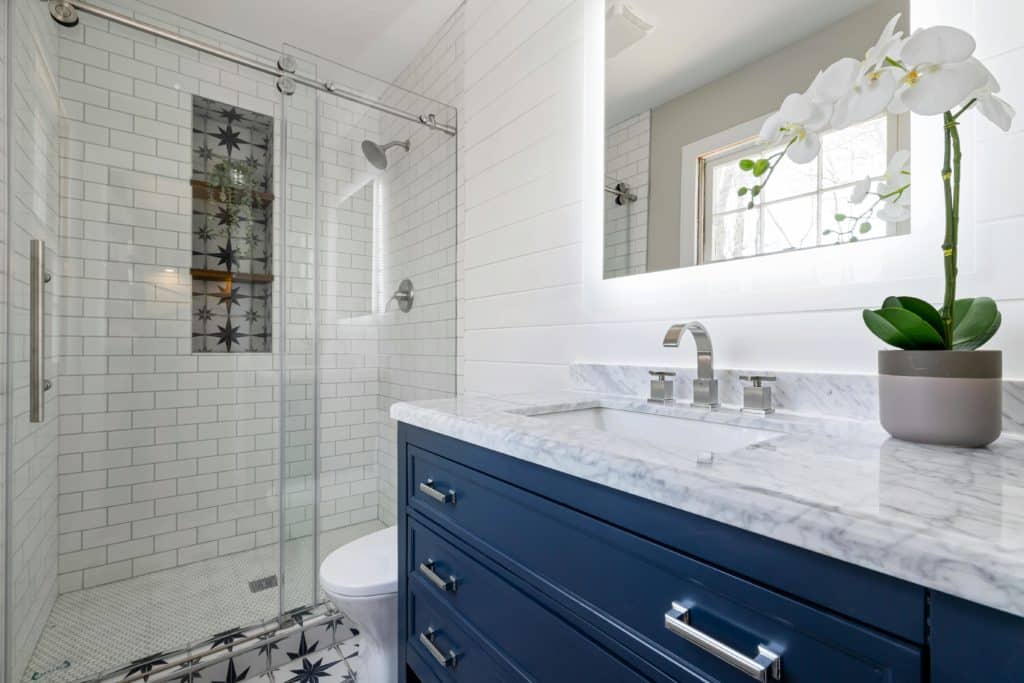Choosing the best tile for shower walls can improve your bathroom’s appearance, usage, and longevity. Keep in mind that waterproof shower tiles are more than just a matter of style. It also fulfills the crucial role of preventing moisture damage in your bathroom. We’ll go over the best tiles for shower walls in this article, including how to choose tiles that will look nice, fit into your budget, and resist water damage, while keeping you safe.
Best Tiles For Aesthetic Shower Walls
Cost, protection, water resistance, and, of course, aesthetics are the most important considerations when choosing the best tiles for shower walls in a remodel. Although some homeowners decide to cover their shower floors and walls with the same kind of tile, shower walls require special attention when trying to maintain protection. You may strengthen the protection by choosing smaller, mosaic-style tiles, and matte and textured tiles that also serve as inspiration for shower tile design ideas.
The following are some visually appealing options for the best tiles for shower walls:
Glass Tile
You may create a unique piece of art on your shower wall with glass tiles. Glass tiles give off a modern appearance because of their transparency, yet they are just as strong and water-resistant as glazed ceramic. They can be used to create distinctive and eye-catching designs because they come in a variety of finishes and color options. The non-porous nature of glass tiles makes them stain-resistant and simple to maintain.
Glass tiles can offer the appearance of transparency, lightness, and airiness to your shower. This can help enlarge the area and bring light into smaller bathrooms, especially when combined with modern frameless glass shower doors.

Glazed Ceramic Tile
Ceramic surfaces are porous. Even with the most thorough scrubbing, water and bacteria can easily escape because of the numerous tiny, microscopic holes. Thus, ensure that the ceramic tile you choose for your shower walls is glazed if you like it.
This will prevent mold and mildew from growing in the tile’s porous areas.
Ceramic glazes are more than just an additional water-resistant layer. Moreover, the correct glazing can greatly simplify cleaning and maintenance. Glazed ceramics come in an even greater range of colors and styles than their porcelain alternatives, and they are more resilient to scratches and dirt accumulation.
Porcelain Tile
Water resistance, durability, and uniqueness are characteristics associated with porcelain tile. Since porcelain has no pores, it does not accumulate mold or soap scum as certain other tile materials do. Porcelain comes in an extensive selection of patterns and colors, so you can choose between a basic subway tile design and something more uncommon. It can also withstand the harshest treatment, making it one of the hardest tile materials out there.
Porcelain is one of the most expensive tile materials because it is a premium material. For more cost-conscious individuals, fortunately, there are options available.
Shower Wall Tiles You Should Avoid
Mistakes in tile choice can affect longevity, protection, and maintenance. The following tiles should be avoided on shower walls:
Glossy Finish Tiles
Although glossy finish tiles have an attractive appearance, they can be extremely slippery when wet, which poses a serious safety issue in a shower. They are not recommended for shower walls because of their slick surface, which increases the risk of slips and falls.
Large Format Tiles
The size of large-format tiles could pose issues when installed on shower walls. They provide fewer grout lines, which reduces traction and raises the possibility of slipping.
Soft Stone Tiles
Although limestone and marble can give a bathroom a sense of luxury, they are quite porous and easily scratched and stained. For protection against damage caused by water and cleaning products, these soft stone tiles need to be sealed and maintained frequently. They’re not as good for shower walls because of their high maintenance demands and susceptibility to damage.
Tips for Choosing The Best Tiles For Shower Walls
Consider The Design
Considering the whole shower wall design is one of the most important things you can do when choosing shower wall tile. Does it look modern? Shoreline-based? Basic? Put the design concept down on paper and give it more detail. You can then go over tile samples and check what matches the other features in your shower, such as the lighting, bathrooms, or even basic items like towels.
Consider The Texture
The way you clean your tile will also be affected by its texture. Deep cleaning is more commonly needed for rougher, more fractured textures than for smooth, polished surfaces. Before committing, be mindful of your time.
Consider The Size
When choosing tile for the shower wall, it’s critical to consider the tile’s size. You should assess the shower wall area about the available options, because there are plenty of options to choose from, ranging from large to small.
In a limited area, for example, big tiles might work nicely. Large-format tiles are a common choice for smaller areas for two reasons: they look like one continuous surface and have fewer grout lines. Conversely, smaller tiles are a wonderful choice for anyone looking for greater traction but will require more grout lines. That being said, as grout needs to be cleaned more frequently, it demands more maintenance.
Consider The Style
A bathroom’s wall overall style should be taken into account when choosing a tile. Do the walls have a color that stands out enough to convince you to go with a more subtle tile color style? Or do the ceilings have more of a subdued appearance, which allows you to enjoy greater freedom when coloring your tiles on walls? Consider this before completing your style design. Working backward and having to paint the whole shower area to match the tile is the last thing you want to do to add to your already heavy workload.

